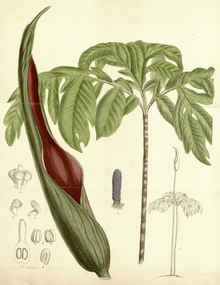Dracontium
Dracontium is a genus of flowering plants similar to those of Amorphophallus. Unlike Amorphophallus which is found in the Old World, this genus has a New World distribution and is native to South America, Central America, southern Mexico, and the West Indies.[2][3][4]
| Dracontium | |
|---|---|
 | |
| 1880 Botanical illustration of Dracontium spruceanum[1] | |
| Scientific classification | |
| Kingdom: | Plantae |
| Clade: | Tracheophytes |
| Clade: | Angiosperms |
| Clade: | Monocots |
| Order: | Alismatales |
| Family: | Araceae |
| Subfamily: | Lasioideae |
| Genus: | Dracontium Blume ex Decne. |
| Species | |
|
See text | |
| Synonyms[2] | |
| |
Dracontium species can be distinguished from related genera by their inflorescence, which is smaller and unisexual.[5] The plant has a large tuber similar to that of Amorphophallus, but rounder, and with no central and circular scar mark. When Dracontium plants begin to flower, the tuber swells and smoothens.[5][6]
Species
More than 20 Dracontium species have been described:[7]
- Dracontium amazonense G.H.Zhu & Croat - Venezuela, Peru, northwestern Brazil
- Dracontium angustispathum G.H.Zhu & Croat - Colombia, Peru
- Dracontium asperispathum G.H.Zhu & Croat - Colombia, Peru, Ecuador
- Dracontium asperum K. Koch - Puerto Rico, Dominican Republic, Trinidad, Windward Islands, Venezuela, Peru, northwestern Brazil, the Guianas
- Dracontium bogneri G.H.Zhu & Croat - Brazil
- Dracontium croatii G.H.Zhu - Carchi and Pichincha Provinces in Ecuador
- Dracontium dubium Kunth - Venezuela, Guyana
- Dracontium gigas (Seem.) Engl. - Nicaragua, Costa Rica
- Dracontium grandispathum G.H.Zhu & Croat - Ecuador
- Dracontium grayumianum G.H.Zhu & Croat - Panama, Colombia
- Dracontium guianense G.H.Zhu & Croat - French Guiana
- Dracontium iquitense E.C.Morgan & J.A.Sperling - Loreto region of eastern Peru
- Dracontium longipes Engl. - Peru, Acre State of Brazil
- Dracontium margaretae Bogner - Venezuela, Brazil, Bolivia, Paraguay
- Dracontium nivosum (Lem.) G.H.Zhu - Pará, Maranhão
- Dracontium peruvianum G.H.Zhu & Croat - Peru, northwestern Brazil
- Dracontium pittieri Engl. - Costa Rica
- Dracontium plowmanii G.H.Zhu & Croat - Peru
- Dracontium polyphyllum L. - Pará, French Guiana, Suriname, Venezuela, Peru, Puerto Rico
- Dracontium prancei G.H.Zhu & Croat - Amazonas and Roraima States of northwestern Brazil
- Dracontium purdieanum (Schott) Engl. - Colombia, Venezuela
- Dracontium soconuscum Matuda - Chiapas, Costa Rica, Panama
- Dracontium spruceanum (Schott) G.H.Zhu - Costa Rica, Panama, Colombia, Venezuela, northwestern Brazil, Ecuador, Peru, Suriname
- Dracontium ulei K.Krause - Acre State in western Brazil; Pando region of northern Bolivia
gollark: I also made a C-based esolang as a joke because someone insisted compiled languages were faster.
gollark: I can write a hello world in it.
gollark: If you like C, try Rust, it has nice memory management.
gollark: Beat this.
gollark: Functional programming forever! Try F#, it has decent OOP interop!
References
| Wikimedia Commons has media related to Dracontium. |
| Wikispecies has information related to Dracontium |
- Fitch (d. 1927) - Curtis's Botanical Magazine v.106 [ser.3:v.36] (1880)
- Kew World Checklist of Selected Plant Families
- erts, R. & Frodin, D.G. (2002). World Checklist and Bibliography of Araceae (and Acoraceae): 1-560. The Board of Trustees of the Royal Botanic Gardens, Kew.
- Forzza, R. C. 2010. Lista de espécies Flora do Brasil "Archived copy". Archived from the original on 2015-09-06. Retrieved 2015-08-20.CS1 maint: archived copy as title (link). Jardim Botânico do Rio de Janeiro, Rio de Janeiro
- Bown, Demi (2000). Aroids: Plants of the Arum Family. Timber Press. ISBN 0-88192-485-7.
- Zhu, G. h. & T. B. Croat. 2004. Revision of Dracontium (Araceae). Annals of the Missouri Botanical Garden 91(4): 593–667
- "Dracontium". The Plant List. Royal Botanic Gardens, Kew and Missouri Botanical Garden. 2010 onwards. Retrieved 21 June 2013. Check date values in:
|year=(help)
This article is issued from Wikipedia. The text is licensed under Creative Commons - Attribution - Sharealike. Additional terms may apply for the media files.